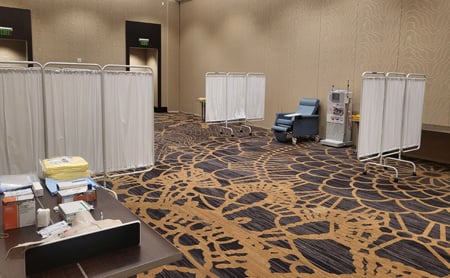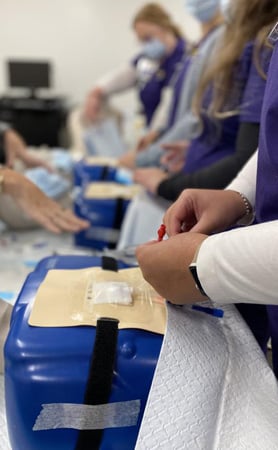Tennessee Partners with Dialysis Facilities to Strengthen Infection Prevention
June 09, 2025 | Alex Kurutz, Joshua Key, Connie Harig
More than 800,000 people in the United States are living with end-stage kidney disease, and over half receive life-sustaining treatment through dialysis. Unfortunately, healthcare-associated infections (HAIs) remain a leading cause of hospitalization and death for this population. Patients undergoing dialysis, especially hemodialysis, are at increased risk for infections due to frequent vascular access, compromised immune systems, and regular exposure to clinical settings. To support patient safety and reduce the risk of dialysis-related infections, it is critical to ensure that facility staff have access to training on evidence-based protocols such as proper hand hygiene and vascular access care.
In Tennessee, the Department of Health works closely with dialysis facilities to identify and address the training needs of their staff and improve infection control practices that advance the safety of patients on dialysis. To gain further insights into this successful partnership, ASTHO spoke with two Tennessee Department of Health personnel — Dialysis Nurse Consultant Joshua Key and Epidemiologist Alex Kurutz — as well as Connie Harig, Nurse Educator from Dialysis Clinic, Inc. in Knoxville, who shared their experiences implementing and participating in this program, shedding light on the process, benefits, and lessons learned from this collaboration.
Identifying Training Needs
To effectively support training facility staff, the Tennessee Department of Health began by looking at what data could tell them about their state’s needs. In addition to reviewing reports from the National Healthcare Safety Network (NHSN), the Department of Health conducted a learning needs assessment in fall 2022 to identify educational and training needs expressed by dialysis providers. All dialysis facilities in Network 8, which encompasses Tennessee, Mississippi, and Alabama, received the assessment, and results revealed that dialysis technicians and nurses desired additional training related to infection prevention practices.
In response, Tennessee initiated the Hemodialysis Infection Prevention Educational Program — a day-long, interactive simulation training, inspired by a similar effort in Massachusetts.
Developing and Implementing the Simulation Training
The department hired four part-time educators — two dialysis nurses, one certified hemodialysis technician, and one biomedical technician — to develop the training materials based on CDC guidance. They also developed pre- and post-tests as well as a training evaluation to assess any increase in knowledge and intent to apply the content moving forward. Lastly, they worked with the Georgia Nurses Association to offer continuing education credits for participating providers.
A typical simulation training has the capacity for about 40 participants and involves an eight-hour day, beginning with brief presentations on each topic and moving into applied practice in the second half of the day during which participants rotate through stations to apply the skills they learned. Participants also hear from a patient advocate to learn more about the real-life impact of dialysis-related infections, an experience many trainees have described as powerful and important. Despite facing initial challenges connecting with a patient advocate, Tennessee Department of Health emphasized its importance, ultimately leaning on partners such as the National Kidney Foundation and the National Forum of ESRD Networks to identify an available advocate.


While the program has seen great success recruiting participants via flyers and targeted outreach, word of mouth has proven to be the most powerful form of advertising. Participants include a wide range of dialysis-associated providers from nurses and technicians to infection preventionists, administrators, clinical students, and even social workers — reflecting a culture where infection prevention is everyone’s responsibility. Throughout the course of implementing the simulations, the Tennessee Department of Health has also been able to identify and respond to additional needs within dialysis facilities (e.g., developing dialysis-specific resources on Candida auris and hepatitis B prevention, in response to questions and concerns from their facility partners).
As a follow-up to the training, the health department offered facilities a consultative Infection Control Assessment and Response (ICAR) on-site visit. These visits evaluate training, competency, and implementation of policies and practices for several infection control domains, which nurses with extensive experience in epidemiology and infection control perform.
“Myself and two of our other nurse managers were able to go to the training in July 2024 at the Department of Health in Knoxville and it was a wonderful workshop. It was something that would be great for all our nurses and technicians to have the opportunity to do. As a direct result of the training, we were also able to have the Department of Health come into our facility for an ICAR visit to help us identify and address any gaps in our efforts to ensure patient safety. Our patients are the reason we exist, and we appreciate the opportunity to make sure we are doing everything we can for them.”
– Connie Harig RN, BSN, Nurse Educator, Dialysis Clinic Inc., Knoxville Region
Measuring Outcomes and Maintaining Efforts
With over two years of simulation data available now, the Department of Health has seen a consistent increase in knowledge from those participating in the training.
Tennessee credits much of their success in establishing new collaborations and informing new updates to the simulation training to their involvement in CDC’s Making Dialysis Safer for Patients Coalition. The Coalition provides members with access to a slew of infection prevention resources, CDC expertise, networking opportunities, and more.
“The first thing that came to mind when thinking of the benefits of participating in the Coalition was how it puts us in collaboration with a lot of different health departments and sparks new ideas of ways to address needs based on what others have done. We've reached out and have also received outreach from other state health departments to just say, ‘Hey — we'd love to learn more about what you're doing.’”
– Alex Kurutz, MPH, Epidemiologist, Tennessee Department of Health
Join the Coalition to Help Prevent Infections in Dialysis Patients
State and local health departments can join the Making Dialysis Safer for Patients Coalition as partners, demonstrating organizational commitment to preventing bloodstream infections in patients on dialysis and gaining access to a network of experts and peers. To join the Coalition as a partner and connect with peers on similar success stories, jurisdictions can contact DialysisCoalition@cdc.gov and request a welcome packet.